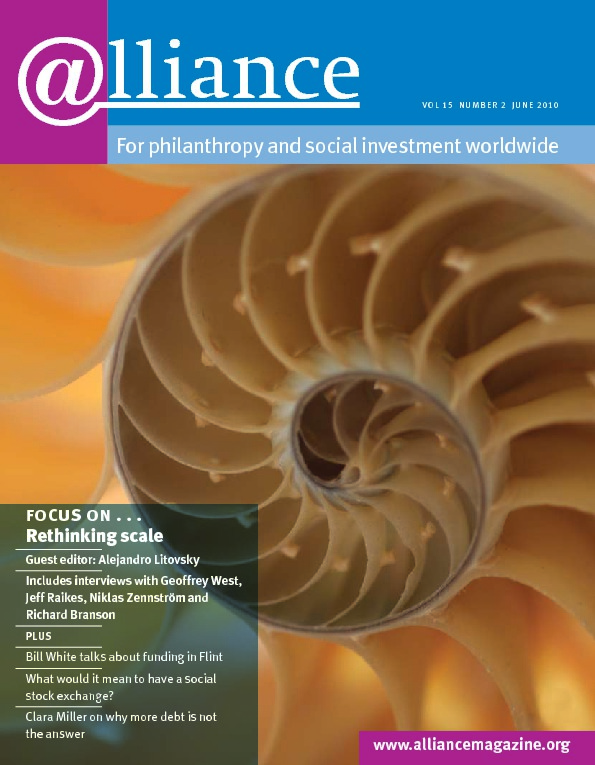In recent years, philanthropy has taken cues from the practices of business and venture capital: follow benchmarks; seek measurable results; provide intellectual capital, not just money; experiment with new approaches. Yet principles of commerce can guide us beyond the administration of philanthropic dollars and shape the social results philanthropists seek.
While compassion and commerce might appear to be different worlds, they are deeply connected: both help people participate and compete. Without medicine from the Gates Foundation, a girl in Mali would fall behind in school. Without a spreadsheet from Microsoft, a small businessman in Ghana couldn’t challenge the bigger players around him. Microcredit is a good example of how commerce and compassion come together. Sometimes funded by philanthropy, its ultimate success stems from engaging people in commerce.
Among businesses, competition is the key to balancing power. Excessive profits attract new competitors, who lower prices and correct the excess. When two businesses compete, it is the buyer who is empowered. Businesses such as state-protected monopolies can maintain undue power, but this stems from politics, not commerce. In any event, the best antidote to any abuse of power is the increased economic clout of ordinary citizens – which usually arises out of commerce.
Historically, commerce has been tremendously beneficial to western countries. Standards of living improved, feeding into a growth in education, arts, media and public opinion. Commercially successful people were then able to pursue philanthropy – another way that commerce and compassion coincide. Commerce also stimulated innovation and entrepreneurship from below, flattening hierarchical structures that existed in feudal Europe – structures that aren’t dissimilar to those plaguing poor countries today. Commerce made former enemies into trading partners, increasing harmony among people of diverse backgrounds.
Poor countries demonstrate the other side of this pattern. There, commerce has not taken hold because, among other reasons, states own the bulk of big economic assets and can exert overwhelming control over people’s lives, resulting in stymied social progress. Economically weak citizens lack the power to effectively demand accountability.
This perspective relates to my own experience with Grameenphone. People in poor countries are hungry for opportunities. They embrace things like mobiles because they enable them to become more economically productive. Ten cents spent on a call can connect someone to an opportunity to make a dollar. This increased productivity and subsequent ability to pay for the enabling technology has been a win-win, enticing billions of dollars of investment into Bangladesh. When Grameenphone started in 1997, there were 400,000 phones; today’s 50 million phones are a testament to the hunger for opportunity.
Because of this win-win, it is possible to create self-scaling economic empowerment – especially when it capitalizes on that hunger. One billion of the world’s citizens make $1 a day and another billion make $2; between them, these discerning investors represent an annual trillion-dollar economy. If raised by one percentage point per year, their annual income would increase by $100 billion in a decade. Mobiles alone have been credited with augmenting GDP by 1 per cent in India; new innovations could do even more.
The success of mobiles in poor countries proves that a compelling tool can overcome opposition to commerce. Aid or mineral wealth have continually propped up governments in poor countries, leading to statism, stagnation and corruption. This hinders local entrepreneurs, exacerbating the challenge of low buying power in area markets. In addition, entrepreneurs often have to contend with anti-competitive practices such as tariffs against their exports or subsidies favouring producers in rich countries. Systemic problems like these can be overcome.
I feel that philanthropists would do well to help the innovators and entrepreneurs. To me, mobiles are most valuable as a lesson: tools can empower people. A philanthropist helped me create the Legatum Center with a gift to MIT, and we help MIT students prepare for an entrepreneurial career in poor countries. Other donors could establish similar centres, in rich and poor countries, or back entrepreneurs with seed funds, or plug innovators into networks of technological know-how.
Entrepreneurs, with their drive and ingenuity, multiply the resources they find. Such drive and ingenuity are plentiful in poor countries. Capitalizing on this can take philanthropists much further than could their capital alone.
Professor Iqbal Quadir is the founder and director of the Legatum Center for Development and Entrepreneurship at the Massachusetts Institute of Technology and the founder of Grameenphone in Bangladesh. Email iqbalquadir@mit.edu






Comments (0)